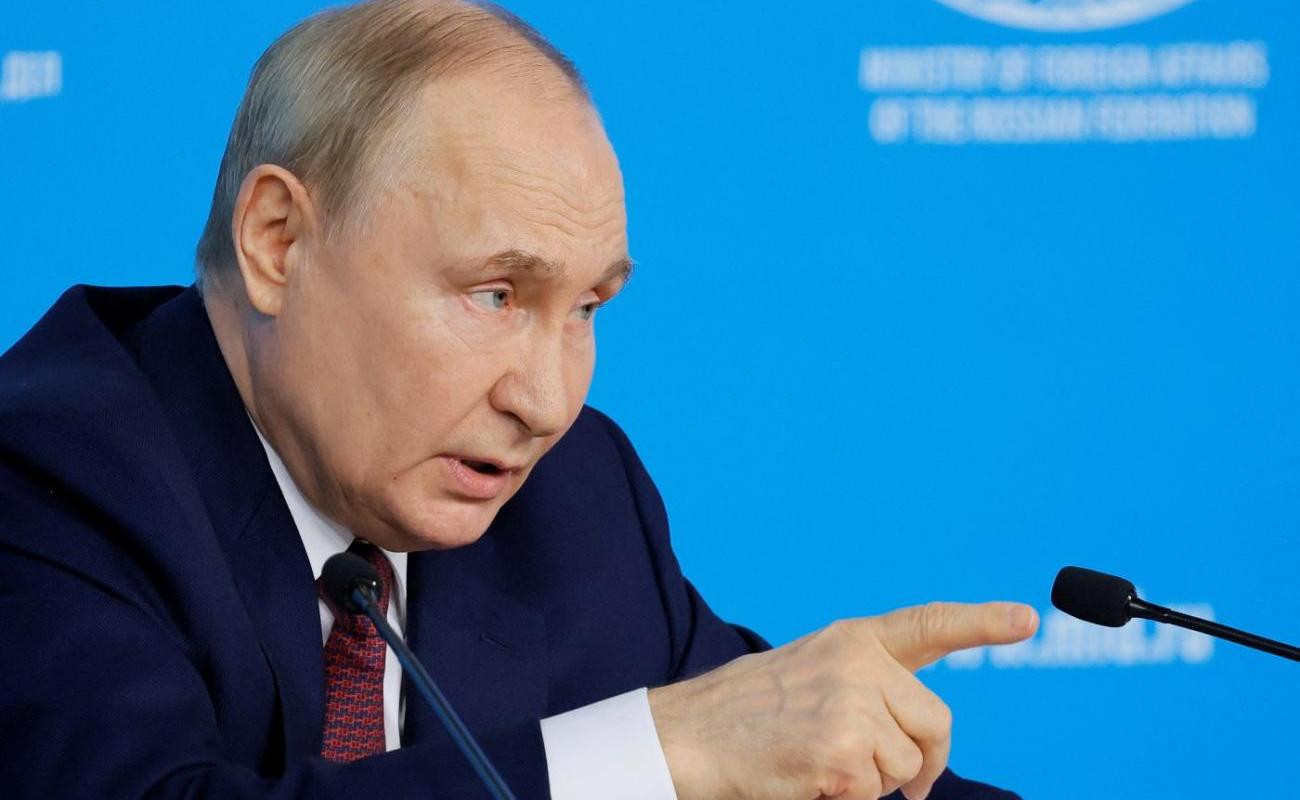The Putin Peace Formula — Surrender or Die

“We are not demanding that Ukraine surrender. We are demanding that Zelenskyy gives the order . . . to stop resisting.” Russia's Foreign Minister Sergei Lavrov, May 1, 2022.
Russia may have abandoned the transparent, comic-opera simplicity of Lavrov’s 2022 language, but the message today remains the same.
Putin produced another wish list on June 14, which he called “a peace offer.” Connoisseurs of Russian officialese will have savored this latest decoupling from reality, in particular the demand that Ukraine surrender more land to the occupier just as it received a total of more than $160bn in foreign war aid and rejuvenated its conscription system to recruit more troops.
Kremlin peace offers follow a certain pattern — the more the Ukrainian armed forces are empowered with Western weaponry and the greater the geographical area where they can deploy it (now including parts of Western Russia), the greater the talk of peace.
The supplies of weaponry are not yet sufficient to force a serious peace offer from the Russian regime, but the trend demonstrates what has become obvious — that there is no path to a cessation of hostilities except through armed force. Once there is a balance of military capacities making further Russian aggression too painful to bear, the Kremlin will buckle. Putin’s Russia understands only power, primarily military power.
Putin’s words nonetheless demonstrate what he wants from Ukraine. Although this time his wish list is limited to four Ukrainian regions plus Crimea, nobody should be fooled. The unstated additional demand is that Ukraine ceases to operate as an independent state. That might begin with an armistice at the current front line, but the war would not end like this. At a later date, Putin would be back for more.
His proclamation raises two questions that require deeper analysis:
a. Who was Putin talking to, and thus making this offer?
b. What does he offer in exchange for the satisfaction of his wish list?
By calling President Zelenskyy non-legitimate, Putin answers the first question himself. He is not speaking to Ukraine. His message is aimed at the wider world — the so-called collective West. The Russian leader imagines himself as another Stalin, organizing virtual Yalta-type negotiations with the contemporary political heirs of Churchill and Roosevelt.
The answer to the second question is indeed fascinating — he offers nothing. Putin’s offer contains no concessions of any sort. It is not therefore a peace offer or any attempt at negotiation, it is merely an ultimatum. Give up what I demand, or the war of aggression continues.
But perhaps Putin’s offer implies the ultimate recognition of Ukraine’s statehood within new borders? No. From the years following his 2014 decision to launch armed aggression against Ukraine to his rambling quasi-historical writings foreshadowing all-out invasion to the late 2021 demands that NATO abandon its Eastern members, and as recently as his June demands setting out Ukrainian surrender terms (see above), Putin has maintained a maximalist agenda.
Even if he did offer something softer (as some have suggested over the so-called Istanbul talks in 2022), he simply cannot be trusted to deliver. Putin is pathologically mendacious, which basically means that he lies every time he opens his mouth. Any hope he would ever change? There’s been no sign of that during his almost 25 years in power.
We have to accept the reality — that this war is a Russian attack against the collective West organized by the Kremlin. Russia demanded the return of the sphere of influence established at Yalta and Potsdam in 1945. But Russia is no Soviet Union.
The myth that Putin has built the “world’s second army” turned out to be illusory. His forces were so badly bloodied in 2022 that it became something little better than scattered gangs of bandits capable of murdering civilians but unable to break Ukraine’s unprofessional territorial defense units. Even 29 months after the start of all-out hostilities, Putin’s forces hold not a single, major Ukrainian city. All this against the background of astronomic casualties both in troops and military equipment.
How has it influenced the Kremlin’s talk of negotiations? Not at all. With a poker face, Putin and his accomplices continue to speak about their demands while staying completely silent about what they plan to offer in exchange.
It is possible that at some point Ukraine and its Western backers might move toward talks. But as they consider the numerous Russian regime statements on “peace plans,” they know that these are nothing more than “informational special operations.” The old man in the Kremlin’s true terms for an end to the butchery are unknown.
Oleksandr Moskalenko is an academic researcher focusing on European politics. He was an in-residence fellow at the Center for European Policy Analysis (CEPA.) He has a Ph.D. in European Law and previously lived in the Ukrainian city of Kharkiv.
Europe’s Edge is CEPA’s online journal covering critical topics on the foreign policy docket across Europe and North America. All opinions are those of the author and do not necessarily represent the position or views of the institutions they represent or the Center for European Policy Analysis.
